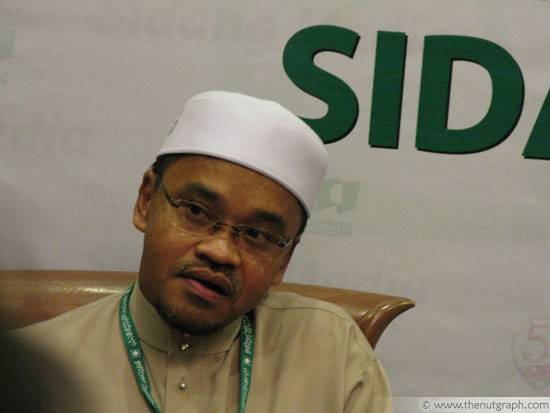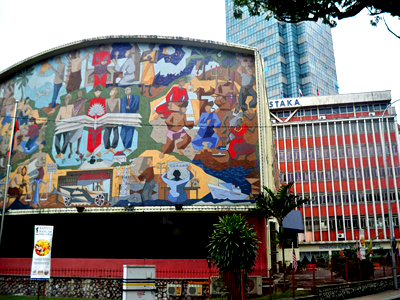
THE Pakatan Rakyat (PR)’s People’s Uprising Rally, dubbed KL112 by some, passed without any major incidents last Saturday. Is the PR any closer to winning power federally? What New Year resolutions do PR parties need to make to stand a real chance at becoming the next federal government and retaining the states they hold?
 Parti Keadilan Rakyat (PKR)
Parti Keadilan Rakyat (PKR)
Challenges
This Malay-dominated multi-ethnic party has prided itself as being centrist, not so much economically, but as a party between the religious PAS and the secular DAP. It likes to believe it is a party of tomorrow embraced by the middle ground. However, the sad truth is, it is less attractive than both PAS and the DAP. It is not Islamic enough compared with PAS, not Malay enough compared with Umno, and not liberal enough compared with the DAP. It, therefore, risks being seen as an inferior good in the eyes of communal voters on both ends.
What about the middle ground? The fact is, there may not be a simply defined and unquestionable middle ground. Because we are a bipolar society, the middle ground in one community may be considered radical in another. Take the use of the word “Allah” by non-Muslims. What view would the “middle ground” hold? And if PKR does markedly worse than PAS and the DAP in the next elections, PKR may be more torn between the differently defined middle grounds, not knowing which one it should fall back to.
Suggested resolutions
![]() PKR certainly needs to think more non-communally. More than that, it should recognise that its real niche is not to bridge the divide between PAS and the DAP but to enable the articulation of so-called communal issues by the “ethnic others”, as PAS did two years ago. PAS’s support of non-Muslims’ right to use “Allah” two years ago was a major coup against Umno’s communal game. It was a powerful political statement when an Islamist party defended non-Muslim rights and spoke against the zealots in its own community.
PKR certainly needs to think more non-communally. More than that, it should recognise that its real niche is not to bridge the divide between PAS and the DAP but to enable the articulation of so-called communal issues by the “ethnic others”, as PAS did two years ago. PAS’s support of non-Muslims’ right to use “Allah” two years ago was a major coup against Umno’s communal game. It was a powerful political statement when an Islamist party defended non-Muslim rights and spoke against the zealots in its own community.
![]() PKR should strive to offer real reconciliation and solidarity in a similar way. Instead of having less extreme Malay leaders talking about Malay issues, bold non-Malay leaders should take up issues close to Malay interests and vice versa. For example, PKR non-Malay leaders could advocate measures to prohibit private sector discrimination, while its Malay leaders talk about about inclusive recruitment of civil service. So, instead of offering moderation in a form inferior to PAS and the DAP, can PKR offer exchanges of role and build trust, which PAS and DAP cannot do as credibly?
PKR should strive to offer real reconciliation and solidarity in a similar way. Instead of having less extreme Malay leaders talking about Malay issues, bold non-Malay leaders should take up issues close to Malay interests and vice versa. For example, PKR non-Malay leaders could advocate measures to prohibit private sector discrimination, while its Malay leaders talk about about inclusive recruitment of civil service. So, instead of offering moderation in a form inferior to PAS and the DAP, can PKR offer exchanges of role and build trust, which PAS and DAP cannot do as credibly?
 PAS
PAS
Challenges
PAS’s contradictory stand on whether non-Muslims can use “Allah” shows that it is in an identity crisis. Some party leaders are apparently anxious over the attacks of Datuk Dr Hasan Ali and Nasharudin Mat Isa that the party is betraying its Islamist ideals in moving to the middle.
PAS’s anxiety is due to its own success in transforming its image. It is now more successful in its secondary market – the non-Muslims – than its primary market – the Muslims. Support for PAS among Chinese Malaysians has risen from between 10% and 20% to possibly beyond 50-60%. This should not come as a surprise, thanks to its mainstreaming efforts and also Umno’s extremism, especially after 2008. However, among Malay Malaysians, it is still second to Umno. PAS’s support can hope to rise beyond 50% only after winning federal power, which would accord it more resources.

How can PAS return to its comfort zone by winning higher support among Muslim Malaysians? The quickest way is to simply chase away some non-Muslim votes in the hope of gaining some Muslim votes. The manner in which a non-Muslim unisex salon in Kota Baru was fined and the temporary about-turn on Allah both signify this trend to restore PAS’s psychological balance. But the trade-off may not pay off as they risk chasing off more votes than they can win back.
If PAS loses some mixed constituencies in the next elections without winning back more Muslim heartland seats in compensation, this would certainly make the hardliners more relevant in the party. So the party’s loss may actually benefit some individuals within the party.
The opposition made significant inroads in the 1990 and 1990 general elections, but due to PAS’s zeal in Islamisation, this contributed to the disintegration and decline of the opposition fronts in the subsequent 1995 and 2004 general elections. If it is not careful, PAS may again save Umno and Barisan Nasional thanks to its own fear of success.
Suggested resolutions
![]() PAS should just live with the fact that it will continue to be more popular among non-Muslim Malaysians than Muslim Malaysians, at least until it enters Putrajaya with its partners. Playing to its gallery at the communal flank risks shooting itself in its foot, and damaging the PR’s electoral chances in the process.
PAS should just live with the fact that it will continue to be more popular among non-Muslim Malaysians than Muslim Malaysians, at least until it enters Putrajaya with its partners. Playing to its gallery at the communal flank risks shooting itself in its foot, and damaging the PR’s electoral chances in the process.
![]() To console itself, PAS should ask a simple question: Is it Islamic banking’s fault that it is more popular among the non-Muslims than the Muslims? If higher non-Muslim support has not made Islamic banking less Islamic, similarly PAS shouldn’t feel less Islamic due to non-Muslim support.
To console itself, PAS should ask a simple question: Is it Islamic banking’s fault that it is more popular among the non-Muslims than the Muslims? If higher non-Muslim support has not made Islamic banking less Islamic, similarly PAS shouldn’t feel less Islamic due to non-Muslim support.
 The DAP
The DAP
Challenges
In contrast to PAS’s identity crisis, the DAP’s crisis is in its unshakeable Chinese-dominated identity. Despite its leadership’s efforts to appeal to Malay Malaysians that the party is not anti-Malay, only one Malay candidate won enough votes to squeeze into the DAP’s 20-member central executive committee.
Unlike PAS, the DAP’s failure to shake this identity is unlikely to affect its seat gain in the coming elections. It is mostly contesting in seats with a majority or significant minority of Chinese Malaysian voters, which will carry the party given the community’s 70-80% support. It will, however, affect its allies – PKR and PAS’s ability to win marginal seats with Malay majorities – and the PR’s overall chances to capture Putrajaya. And if PKR and PAS do badly with Malay Malaysian votes, the PR will likely face great pressure to disintegrate, not least because Umno will play up more ethno-religious sentiments to force the two Malay-based opposition parties to outdo each other.
Suggested resolutions
![]() What can the DAP do to free itself of this original sin of being a “Chinese-dominated” party? Thinking out of the box, it should turn its weakness into a strength by proving that with political will, a Chinese-based party can take better care of Malay Malaysians than even the Malay-based parties. In other words, the Malay agenda should be transformed from a question of position to an issue of competence, where a so-called Chinese party may beat its Malay-based competitors.
What can the DAP do to free itself of this original sin of being a “Chinese-dominated” party? Thinking out of the box, it should turn its weakness into a strength by proving that with political will, a Chinese-based party can take better care of Malay Malaysians than even the Malay-based parties. In other words, the Malay agenda should be transformed from a question of position to an issue of competence, where a so-called Chinese party may beat its Malay-based competitors.
![]() In this sense, as a Chinese-dominated state under the DAP, Penang should aggressively pursue class-informed policy to help the poor, who are predominantly Malay. This may signal to lower- and lower-middle-class Malay Malaysians that they, and not their upper-class cousins, will be better taken care of when class, instead of ethnicity, becomes the yardstick for state aid.
In this sense, as a Chinese-dominated state under the DAP, Penang should aggressively pursue class-informed policy to help the poor, who are predominantly Malay. This may signal to lower- and lower-middle-class Malay Malaysians that they, and not their upper-class cousins, will be better taken care of when class, instead of ethnicity, becomes the yardstick for state aid.

![]() As Dewan Bahasa dan Pustaka has generally failed to promote the Malay language as a language of knowledge, Penang should perhaps consider setting up an institute to promote research and publication in social science and humanities in the Malay language or about the Nusantara civilization. Scholarships should be given to Ph.D students working on Malay/Nusantara studies or in the Malay language.
As Dewan Bahasa dan Pustaka has generally failed to promote the Malay language as a language of knowledge, Penang should perhaps consider setting up an institute to promote research and publication in social science and humanities in the Malay language or about the Nusantara civilization. Scholarships should be given to Ph.D students working on Malay/Nusantara studies or in the Malay language. ![]()
Wong Chin Huat is a political scientist by training and was a journalism lecturer prior to joining the Penang Institute, a Penang government think tank. If readers have questions and issues they would like Wong to respond to, they are welcome to e-mail editor@thenutgraph.com
[related-posts]


TanWeeHan says
Valid suggestions throughout, but will they listen? There is a tendency for PR to become arrogant nowadays, not to mention so caught up with their dreams of becoming ministers that they no longer heed the advice of many among the rakyat.
Andrew I says
Ideally, a politician should be made to take care of a community other than his or her own. This would necessitate a real understanding of communal sensitivities and take inter-racial understanding to the next level.
Guan Eng should know something about this.
Gopal Raj Kumar says
I would suggest that a politician should give priority to the community that is his constituency mindful at the same time that in a democracy the tyranny of the majority is not an excuse for ignoring the balance and needs of minorities. The minorities on the other hand ought not to demand what is disproportionate to the needs and demands of the winner in the majority, especially where such demands and needs are lawful.
Being a good politician needs skill and balance. In the case of the opposition they field a bunch of morons whose only excuse is that if the government can do that so too can we. And better so.
Gopal Raj Kumar says
The use of the word “Allah” is a red herring not capable of advancing any political, economic or intellectual agenda of either side of the divide.
What Pakatan needs to come out with categorically and unequivocally is a statement from the incredulous Anwar Ibrahim that Malaysia will not become a second Iran (meaning a theocracy) as he alluded to when interviewed by VS Naipaul the writer. Anwar said then that he intended the Ayatollah’s Iran to be a model he wanted to present to Malaysia to awaken it.
That statement being a matter of record conveniently hidden in the annals of Anwar’s inconvenient and inconsistent chequered history is perhaps the reason why many including within the ranks of his own Pakatan are uneasy with the alliance with PAS and with Anwar’s continued gaffes and political disasters.
What the Pakatan and each of its constituent components need are not New Year resolutions but solid costed policies. That they have not presented to the people. A surprise or a bag of goodies that they plan to present on announcement of the election date will not do.
To the majority it is: “Better the devil we know than the devil we don’t”. Whilst Europe stands behind regime change, they continue to tear gas and baton charge protesters in Greece, their economies continue to falter and slip into unredeemable positions from failed government schemes whilst Malaysia continues to enjoy growth rates that can only be envied by Europe and the US.
Regime change is about as reliable now as what’s happening in Egypt, Tunisia, Libya and their fall out in Washington.